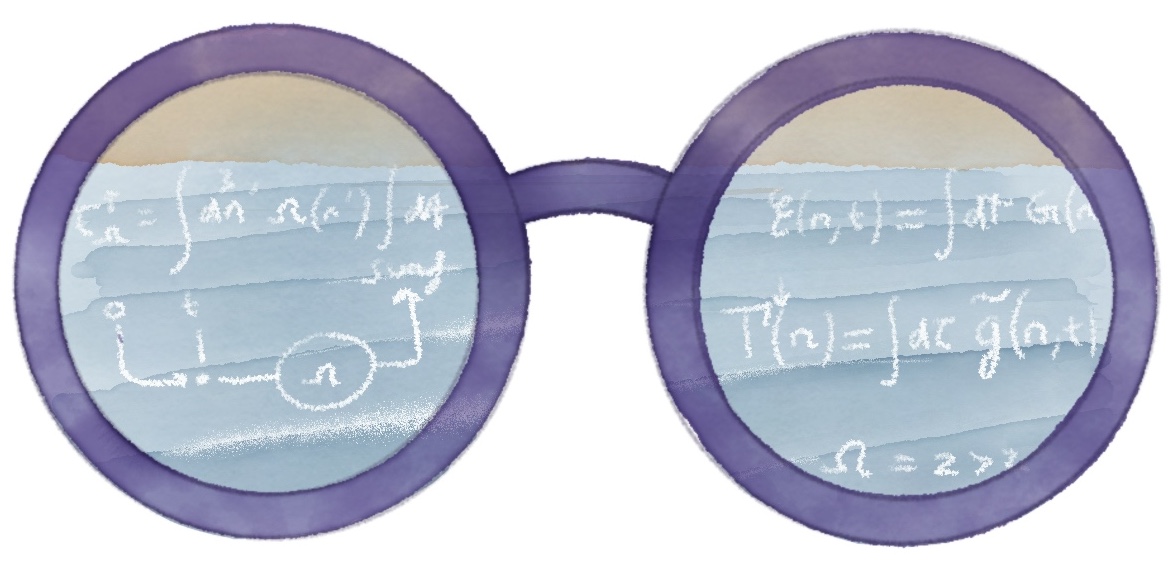
About me
I am a scientist with broad scientific training and expertise in modelling biogeochemical tracers in the ocean. As a postdoc during the past few years, I have worked on the ocean's nutrients, carbon, and oxygen cycles, and on their response to climate change. Today I am looking for a new project and want to put my skills at the service of the fight against climate change. So contact me if you have a project aligned with my profile!
I spent most of my time thinking about the fascinating mechanisms that drive the cycles of carbon, nutrients, and oxygen in the global ocean. To improve our understanding, I built numerical models of tracers in the ocean. This required engaging with a diverse range of research fields including biology, geology, chemistry, and physics. It also required deep knowledge of advanced mathematical and computational tools. My education —both as mathematician and engineer— helped me develop new ideas and methods to tackle challenging questions in Ocean Science. I have always carefully thought about data visualisation, and about effectively communicating somewhat complex ideas. When possible, I also spent time developing open-source packages.
An overarching theme of my research is the interplay between the ocean's circulation and biogeochemical tracers. These tracers include macronutrients, like phosphate and nitrate, but also trace metals such as iron, nickel, or cadmium, which together sustain all life in the ocean. I have also been interested in carbon, which the ocean stores in huge quantities, and in oxygen, which fish need to survive. Furthermore, I have been working with tracers of the ocean circulation, such as neodymium isotopes, which record past ocean circulation patterns, and more abstract tracers such as the water age (which measures ocean ventilation), the time to reemergence (whcih controls ocean carbon sequestration), or the upstream exposure time to respiration (which controls oxygen levels). However, all of these tracers are predicted to respond dramatically to climate change, possibly threatening many marine ecosystems, with impacts on global food security. This is why I want to contribute to the fight against global warming and its adverse effects.
In my latest research, I have been taking a closer look at the response of these tracers to climate change. As a Postdoctoral Research Associate at the University of New South Wales (UNSW) in Sydney, I built a marine biogeochemistry model and looked at the response of the ocean's carbon and oxygen cycles to global warming (with Associate Professor Mark Holzer). More recently, as a Contract Researcher for the CarbonLock Future Science Platform of CSIRO (Australia's National Science Agency), I combined cutting edge transport-matrix methods to estimate the sequestration efficiency of the deep ocean and its response to climate change from climate-model archives (with Dr. Richard Matear). See my Publications for an up-to-date publication record.
Resume
For details, see my likely up-to-date CV in PDF format. For a visual summary, see the timeline below, which provides a month-by-month overview of my resume going back 25 years.
Made with Makie.jl (code available on GitHub).
Our duty as scientists is to make sure we understand our environment well enough to prepare for its abrupt change and prevent the worst outcomes. I commend my fellow sea-going oceanographers, who play a crucial role in this pursuit by providing us with an ever-growing set of critically important observational data. As a mathematically inclined oceanographer, I am committed to putting my skills and energy towards answering the profound science questions posed by our changing environment and towards educating the next generation of scientists that will eventually take over. Despite my work continuously exposing me to the grim outlook of climate change, I am regularly amazed by the scientific discoveries that we make and the positive outcomes that we can achieve. I remain scientifically fascinated by the complex interplay between the ocean, biology, and climate, and I look forward to making a difference by working alongside inspiring collaborators.